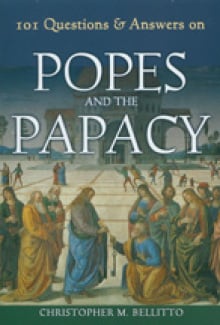By Daniel Burke
c. 2008 Religion News Service
ANDREWS AIR FORCE BASE, Md. — Pope Benedict XVI, the shepherd of the world’s 1 billion Roman Catholics, arrived here Tuesday (April 15) for his first U.S. visit as pontiff and was warmly greeted by President Bush, first lady Laura Bush and their daughter Jenna.
Neither the pope nor the president offered public remarks after Shepherd One, the pope’s chartered Alitalia Boeing 777, touched down at 4 p.m. Both are expected to speak at an elaborate White House ceremony Wednesday.
Assorted Catholic and U.S. dignitaries, 500 military personnel and their families, the U.S. Armed Forces Honor Guard and a Catholic high school band from Forestville, Md., gathered on a gusty airport tarmac to greet Benedict.
It was the first time Bush has met a foreign leader at the airport, which the White House called a gesture of respect for the pope and standing protocol for a papal visit to American shores.
Before he even touched down, the pope addressed one of the most pressing issues in the U.S. church, telling reporters on the papal plane that he was “deeply ashamed” over the “great suffering” caused by the clergy sexual abuse crisis that erupted six years ago.
“If I read the histories of these victims, it’s difficult for me to understand how it was possible that priests betrayed in this way their mission to give healing, to give the love of God to these children,” Benedict said.
For the first time in nearly a decade, since John Paul II visited St. Louis in 1999, the nation’s nearly 65 million Catholics will see the pope in their own backyard.
Because of his advanced age — Benedict will turn 81 Wednesday — the six-day trip is limited to just Washington and New York. In a video message to Catholics before his departure, however, the pope said he hoped to use the trip to “reach out spiritually to all Catholics in the United States.”
While Benedict may be familiar with America — he visited five times as a cardinal — America seems less familiar with him, according to recent polls. More than 80 percent of Americans said they know “not very much” or “nothing at all” about the pope, found a survey conducted by Marist College of Poughkeepsie, N.Y.
That may change between now and Sunday, when the pope returns to Vatican City. During his trip, Benedict will meet with Bush at the White House, address the United Nations, speak to nearly 400 Catholic educators, headline a rally with 22,000 Catholic youth, gather with ecumenical and interfaith leaders, and celebrate Mass with more than 100,000 pilgrims in ballparks in Washington and New York.
“He is coming to the United States to preach the gospel,” said the Rev. Thomas Reese, senior fellow at the Woodstock Theological Center in Washington. “He’s coming like any pastor to inspire and challenge his congregation and he is going to avoid like the plague getting involved in the presidential election.”
Still, that may not prevent the three remaining presidential candidates, all of whom have launched organized appeals to Catholic voters, from parsing Benedict’s every word to their advantage.
“The pope is very likely to talk about issues, and issues can matter to voters,” said John C. Green, a senior fellow at the Pew Forum for Religion & Public Life in Washington. “For example, if he stresses conservative social issues such as opposition to abortion and same-sex marriage, that may energize conservative Catholics. And if he speaks out against the Iraq war or talks about social welfare issues and immigration, that may energize the liberal Catholic left.”
Since the beginnings of his papacy, however, Benedict has largely concerned himself with internal church and theological matters.
Unlike his charismatic predecessor, John Paul, Benedict seems as concerned with the world of the church as he is with the church in the world. When he addresses society, as he will at the United Nations, he often speaks of a need to recognize universal truths grounded in natural law.
In other venues here, Benedict will confront a Catholic Church that is undergoing profound transformation. Nearly 30 percent of all U.S. Catholics have Latino roots, and more than one-third of people raised Catholic have left the faith, according to a recent Pew study.
And five years after the clergy sex abuse scandal broke open, bankrupting six dioceses and demoralizing large swaths of the U.S. church, parts of the church are still struggling to recover, according to lay and clergy leaders.
“I would say that in certain parts of the church in the United States,” said Monsignor Robert Panke, director of priest vocations for the Archdiocese of Washington, “there is a real need for a boost and an experience of hope and an increase in morale both among priests and the laity.”
Copyright 2008 Religion News Service. All rights reserved. No part of this transmission may be distributed or reproduced without written permission.
More from Beliefnet and our partners

